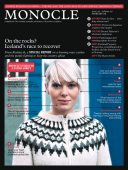
Issue 20
On the rocks? Iceland’s race to recover. From Reykjavik, a special report on a looming mass exodus and the people fighting to keep the country afloat.
In This Issue
Oops! No content was found.
Looks like we no longer have content for the page you're on. Perhaps try a search?
Return Home

